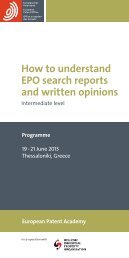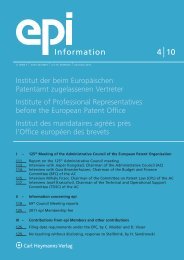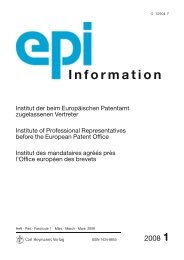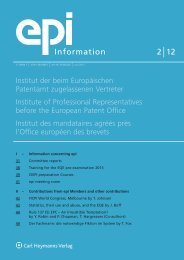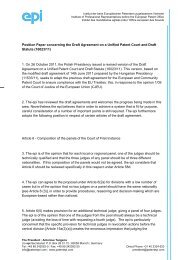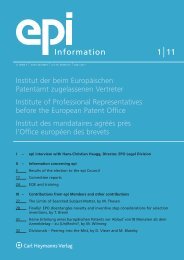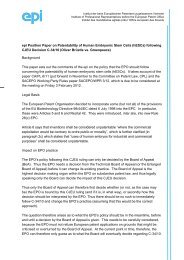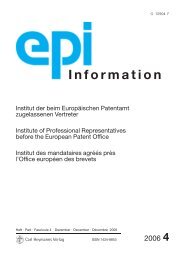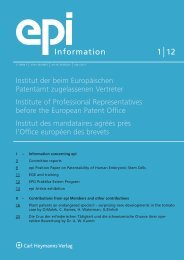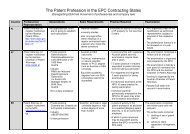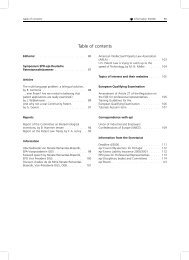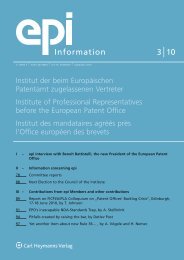epi Information 2/2009
epi Information 2/2009
epi Information 2/2009
You also want an ePaper? Increase the reach of your titles
YUMPU automatically turns print PDFs into web optimized ePapers that Google loves.
62 Articles <strong>Information</strong> 2/<strong>2009</strong><br />
become a party to the examination proceedings, and<br />
those observations do not lead to the application being<br />
examined sooner than others in the backlog.<br />
4. A proposed solution: ’Expedited Examination’<br />
This article proposes a solution that can substantially<br />
eliminate the negative effects in section 3 above. In<br />
particular, the time wasted by examiners and European<br />
Patent Attorneys can be greatly reduced, hence saving<br />
costs to the EPO and applicants. There would also be<br />
gains in patent quality.<br />
It’s first necessary to accept that, for many patent<br />
applications, the applicant currently has great economic<br />
incentives to allow the examination process to last as<br />
long as reasonably possible. The fact that the EPO is not<br />
deluged by applicants complaining about delays in<br />
examination provides another strand of evidence for this.<br />
In essence, most representatives experience work with<br />
the EPO as a two step process. Firstly, a significant fee has<br />
to be paid to initiate a phase of work, e.g. examination or<br />
opposition. Then that phase of work begins. Importantly,<br />
the examiner’s time is ’free at the point of use’ for the<br />
representative during that phase of work. The same<br />
examination or opposition fee is payable, no matter<br />
how many hours of an examiner’s time are needed to<br />
settle the case. So a ’direct grant’, in which the EPO does<br />
not even issue an examination communication, costs the<br />
same examination fee as an application which requires<br />
two examination communications and oral proceedings,<br />
spread over three years.<br />
Once it is understood that the fee paid by an applicant<br />
or opponent is not correlated with the workload per<br />
case, then it becomes clear that solutions are possible.<br />
What is needed is an incentive for applicants to bring<br />
their applications into conformity with the EPC much<br />
sooner than is currently the case, or for opponents to act<br />
more quickly in opposition proceedings. That incentive<br />
must be greater than the incentives to delay as long as<br />
possible.<br />
The proposals shown in Table 1 below offer a solution.<br />
Table 1 explains three new options for applicants and<br />
opponents. These options are henceforth collectively<br />
termed ’Expedited Examination’. These options differ<br />
from the EPO’s ’PACE’ measures, in that their use would<br />
reduce costs significantly.<br />
None of the three options would be compulsory. These<br />
options are politically easy to implement, precisely<br />
because they are simply additional choices. Importantly,<br />
they would be attractive to SMEs, which the EPO has a<br />
particular duty to help. However, any applicant wishing<br />
not to use them would be free to continue as presently.<br />
Expedited Examination has two interlinked aims.<br />
These are:<br />
(i)<br />
To encourage applicants to submit requests for<br />
examination earlier, and, once examination has<br />
started, to respond earlier to any communication<br />
issued by the EPO.<br />
(ii) To provide as many applicants as possible with a<br />
strong financial incentive to be proactive, early. Here<br />
’proactive’ means both putting an application in<br />
order for grant as early in the application process<br />
as possible, without prompting, and responding as<br />
completely as possible to any objections that are<br />
eventually raised by the EPO.<br />
Table 1: Expedited Examination<br />
1. Examination fee refund<br />
The examination fee would be refunded, if:<br />
a) An applicant makes a request for examination within one month<br />
of transmittal of the search report;<br />
b) The EPO grants the patent either without issuing an examination<br />
report, or with only one examination report having been<br />
issued, and without oral proceedings;<br />
c) When one examination report is issued, the applicant provides a<br />
comprehensive reply to that report within one month.<br />
2. Opposition fee refund<br />
The opposition fee would be refunded to any opponent who:<br />
a) Filed their opposition within one month of the mention of grant<br />
of a European Patent;<br />
b) Replied within one month to any communication from the<br />
opposition division; and<br />
c) States in any request for oral proceedings that they would<br />
attend at one month’s notice, and subsequently does attend if<br />
they accept an invitation.<br />
The opposition fee would only be refunded if an amendment were<br />
made to the granted patent, or the patent were revoked, as a<br />
consequence of at least one of the grounds cited by the opponent.<br />
3. SME refund<br />
Where the conditions for refund of an examination fee were met,<br />
and the applicant was an SME, the applicant would also be entitled<br />
to a refund of the search fee if:<br />
a) All the independent claims, as originally filed, were granted<br />
without amendment of their scope.<br />
In each of refunds 1-3 above, the applicant or opponent would<br />
have to request a refund at the start of the relevant procedure, and<br />
would have to state in that request that they intended to abide by<br />
the conditions given above.<br />
Refund of the examination fee would only be made<br />
when the applicant has submitted translations of the<br />
claims, and paid the fees due under Rule 71(3), (6) and<br />
(9) EPC.<br />
The proposal for opposition fee refund would not<br />
change the maximum time of nine months permitted by<br />
Art. 99 EPC for submitting an opposition. However, once<br />
a stage had been reached when the majority of oppositions<br />
were filed within one month, the maximum time<br />
permitted should be cut to four months and the opposition<br />
fee increased. The advent of on-line databases of<br />
prior art has reduced radically the time necessary to<br />
gather prior art for inclusion in an opposition, since the<br />
EPC was originally drafted, and these changes should be<br />
seen in the light of that.<br />
It is also important to realise that many proprietors<br />
would be better placed if they received the prior art cited<br />
in an opposition only one month after grant, rather than<br />
nine months after grant. This reduces uncertainty for<br />
them.<br />
The SME refund would provide a much greater incentive<br />
for applicants to search thoroughly, before filing<br />
cases at the EPO. Many more SMEs would change their<br />
claims after receiving a search report from a national<br />
office, before applying to the EPO. Others will carry out<br />
more thorough searches themselves. European Patent<br />
Applications resulting from such preparation would then



